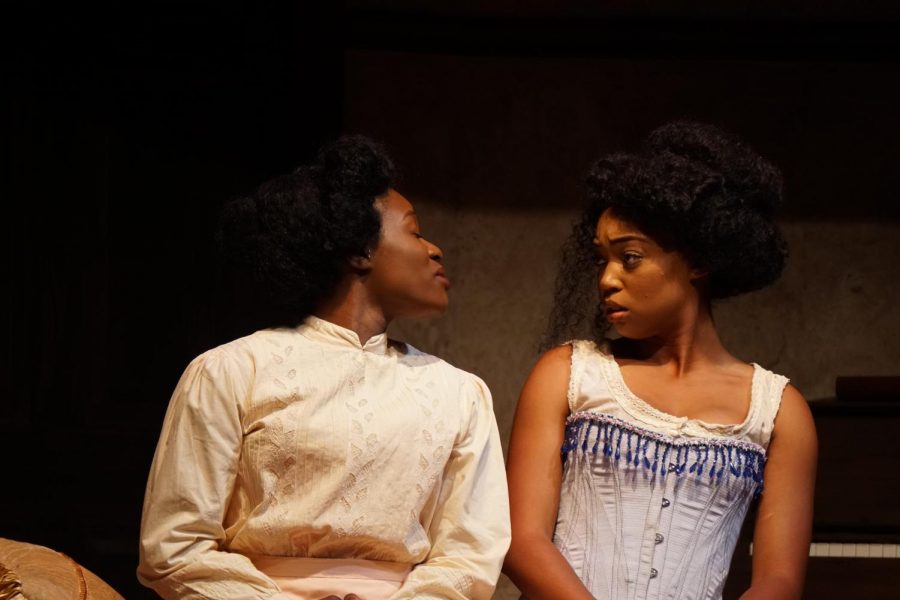Black actors take center stage in “Intimate Apparel”
October 3, 2019
In the buildup to the premiere of the University of Alabama Department of Theatre and Dance’s production of “Intimate Apparel,” the cast and crew juggle passion and excitement as they prepare to showcase a story that celebrates women, blackness and family.
The setting of “Intimate Apparel” is 1905 New York City, 40 years after the close of the Civil War and roughly 10 years before the Harlem Renaissance. The main character, Esther, played by Kyra Davis, is a black seamstress who sews and sells intimate apparel to people from all different rungs of New York Society – ranging from wealthy white socialites to black prostitutes. Eventually, through a mutual connection, she develops a routine correspondence with a Caribbean man, George Armstrong, who she has never met. A narrative wrought with trials and tribulations soon unfolds as Esther struggles to navigate a complex web of secrets and various hardships.
Penned by two-time Pulitzer Prize winner Lynn Nottage, the University’s production of “Intimate Apparel” is showing this week at Marian Gallaway Theatre. The production features a majority-black cast, which excites many actors involved in the UA Department of Theatre and Dance. Alexa Nunn, a junior majoring in theatre who plays Mayme, a New York prostitute and Esther’s close friend, thinks it’s a step in the right direction.
“As an actor, it’s hard,” Nunn said. “Growing up, I remember going to audition rooms in middle school and high school, knowing I wasn’t going to get a role because I don’t look like Cinderella, or I don’t look like whoever. So coming into this space, it was a different type of confidence I had, and it was really needed in this educational theatre environment.”
Nunn’s castmate, Raven Jeanette Cotton, a junior theatre BA who plays the role of Mrs. Dickson, felt similarly.
“I just really like that we’re doing a black show,” Cotton said. “We need this in today’s society.”
However, race is not the only theme present throughout “Intimate Apparel;” the strength of women and their resilience in trying times is also a recurring motif.
“I really like how it showcases black women, and how it empowers them throughout the show,” Cotton said. “Just women in general and what they go through [is remarkable]. I love how the show shows that no matter what class you’re in, we all have flaws and we all have secrets. You just have to learn from them.”
What makes “Intimate Apparel” special is its ability to resonate with people of all sorts of different racial backgrounds, genders, class and family histories. The writing of the play was originally inspired by Nottage’s own desire to investigate and celebrate her family history.
“Because of the fact that ‘Intimate Apparel’ was created out of Lynn Nottage examining her own history, and finding out about her own history – it all started when she had found a photo of her great-grandmother – there’s a softness to this show,” Matt David, director and instructor of graduate directing, stage management and theatre history, said. “And I think it creates an environment where everybody can find catharsis in it because everybody can relate to that idea of understanding that connection to their family.”
An admirer of Nottage’s catalogue, Davis was excited to direct this production. He proposed an “Intimate Apparel” production years ago.
“It’s funny,” David said. “Years ago, when I was actually a graduate student here, I had proposed ‘Intimate Apparel’ as a show I was interested in directing here. Lynn Nottage is prolific. She’s always approaching her material in a completely different way. You read one play of hers, and it’s set someplace completely different from the next. One is intense, and one is soft.”
This sort of enthusiasm for Lynn Nottage’s work and specifically for “Intimate Apparel” infected most members of the production company. Members of the production hope that this play can help spark a larger movement, especially throughout the theatre department.
“I think for this department to see that a period piece isn’t always Victorian white people,” Nunn said. “Because that’s not America’s history. It’s really not. And I hope our department sees that … It’ll be something so great for younger theatre majors like me coming in. As a freshman, I didn’t know if I was going to be cast, [even though] I was told I was, no matter the color of my skin. Seeing [this production] gives you a new kind of hope.”
Editor’s Note: A previous version of this story stated that “Intimate Apparel” was the University’s first production with a majority-black cast. This is incorrect. The story has been updated to reflect that error.











